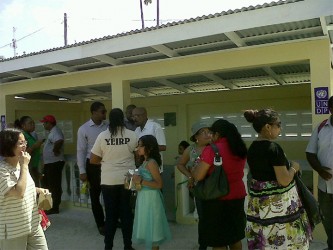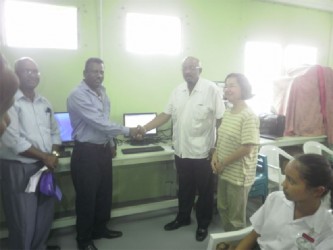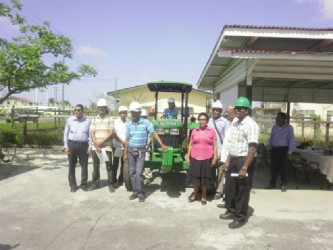By Kenesha Fraser
Three projects including an $8.4 million venture to mechanise farming at Tapakuma, Region Two through the provision of a tractor, were commissioned on Wednesday.
Minister of Local Government and Regional Development Norman Whittaker along with United Nations Develop-ment Programme (UNDP) Deputy Resident Repre-sentative Chisa Mikami and other officials visited Region Two for the commissioning of the projects.
At the Regional Democratic Council compound in Anna Regina, the Tapakuma Women’s Agri-cultural Diversification Project was launched. According to national co-ordinator of the Caribbean Local Economic Develop-ment (CARILED) programme Dhanraj Singh, the project was funded by Foreign Affairs, Trade and Development Canada in partnership with the Ministry of Local Government and aims to strengthen local institutions by providing support services to small businesses.

“The project is implemented by the Federation of Canadian Municipalities (FCM). An initial consultation with the women of the Tapakuma Mission and the council was done. CARILED along the Regional Democratic Council also held an assessment to ascertain what the community was facing in order for them to develop their own agricultural project and out of the assessment project we recognized that the community lacked significantly, some level of mechanism pertaining to agriculture. Everything was manual and human-driven and there was need for some level of investment in mechanization. It was then that in several rounds of consultation, the decision was made to provide the community with a tractor that they can use to do large-scale agriculture,” he said.
The project which is focused mainly on the drive to improve agricultural production in the Tapakuma area cost about US$42 000 ($8.4 million). This sum covered a number of activities such as training and purchasing of the tractor and related equipment.
Toshao of Tapakuma, Doreen Jacobis expressed how happy she was to receive the equipment. “These equipment will help us in farming. Our dreams became a reality and we are extremely happy. Farmers will all be able to benefit and we promise to take good care of the equipment,” she said.
Whittaker told the gathering that the machines will assist in preparing the land for cultivation and thus yield better crops.
Certificates were awarded to several persons who completed a two-day practical training course in the operation and maintenance of the tractor. The training was done at the Essequibo Technical Institute. Whittaker also handed over the documentation for the vehicle to Jacobis. Other equipment provided included a plough, four knapsacks sprayers and four chainsaws.
Supenaam shed


Earlier, a shed for commuters was commissioned at Supenaam. The Youth Empowerment Inclusion Development (YEID) project cost $1 million. Funding was provided by the UNDP. Whittaker said that the facility has filled a void which existed over the years.
He appealed to residents to take care of the shed and noted that the initiative arose out of a programme undertaken by the YEID through which youths are trained to be involved in community projects.
Whittaker also visited the ICT Hub at Cotton Field, Essequibo Coast. The UNDP donated two computers to the institution recently. The minister noted the importance of information technology and said that the Minister of Education is determined to ensure that each secondary school is equipped with a computer lab.
“Our focus is on this computer lab and at the government level, we also have the OLPF (One Laptop Per Family) project which aims to bring the hardware and technology to many households. It’s not just about providing the hardware but it is about ensuring that the recipients or beneficiaries understand how to use the hardware to access information,” he said while emphasizing that the project is not only for urban areas but the hinterland as well.
Meantime, Mikami pointed out that high on the UNDP’s agenda is the setting up of ICT labs in every region of Guyana. “We want to provide the young people with high-tech skills so that they can become technology oriented.
Our aim is for the youths to overcome communication barriers. I urge all the young people to make full use of this ICT hub at all times,” she said.
Another UNDP official said that the project is the first of two for the Region. “These projects were youth-led and youth-driven with the help of the Government of Guyana. A number of young people have benefited from project and training was completed and they are now in internship,” the official said.








